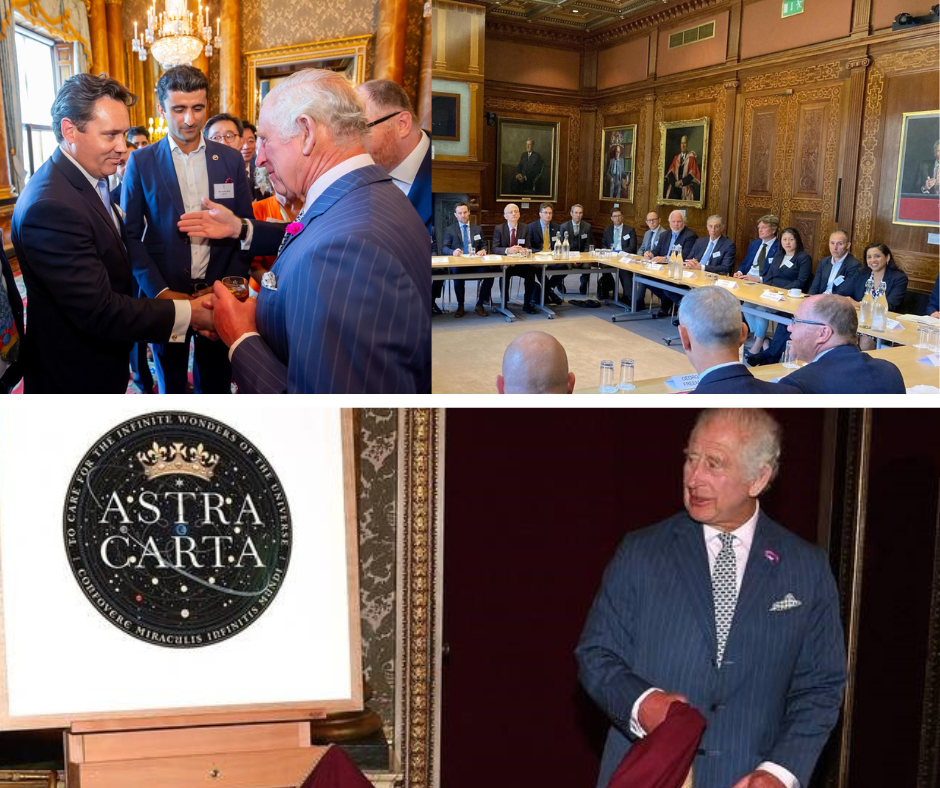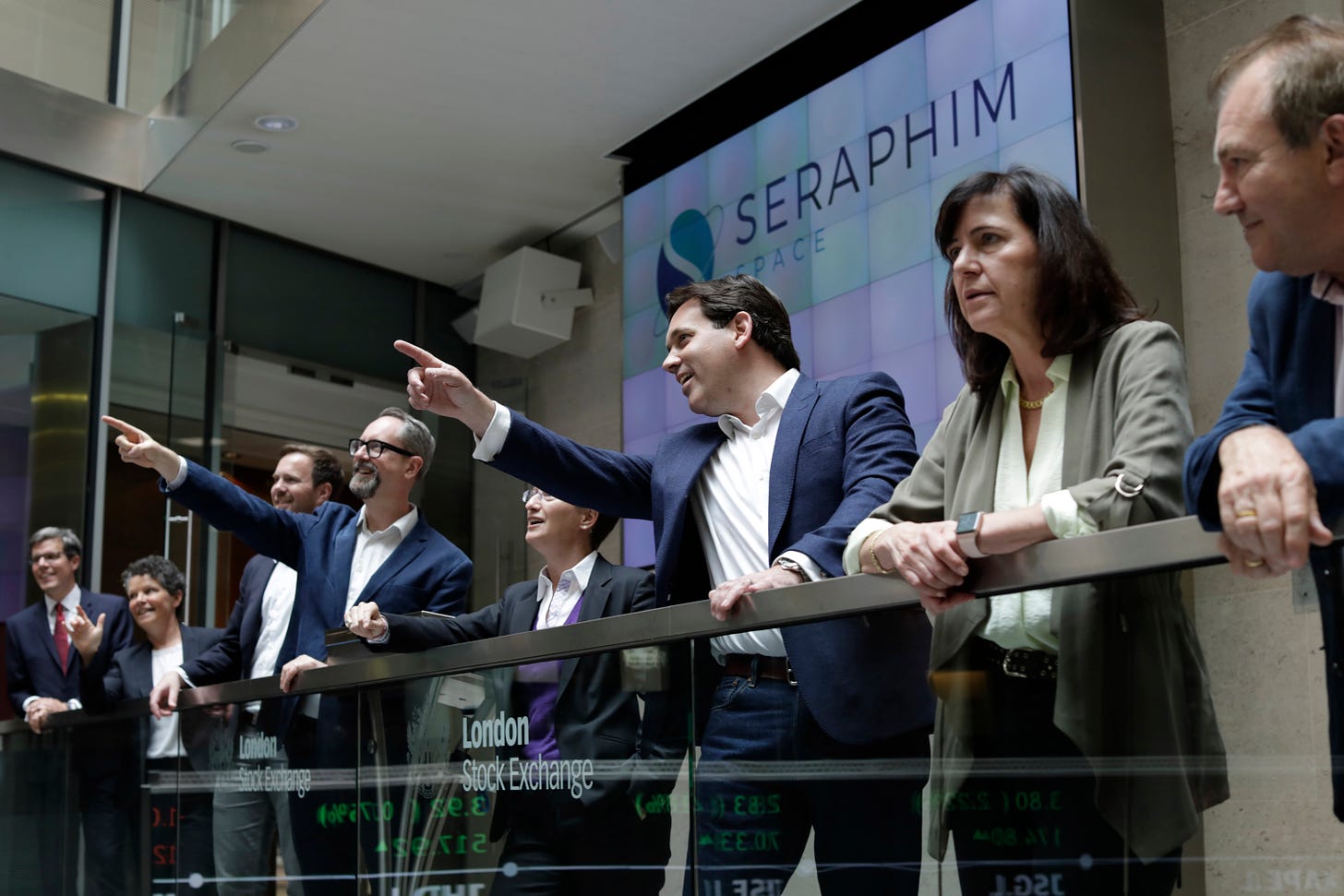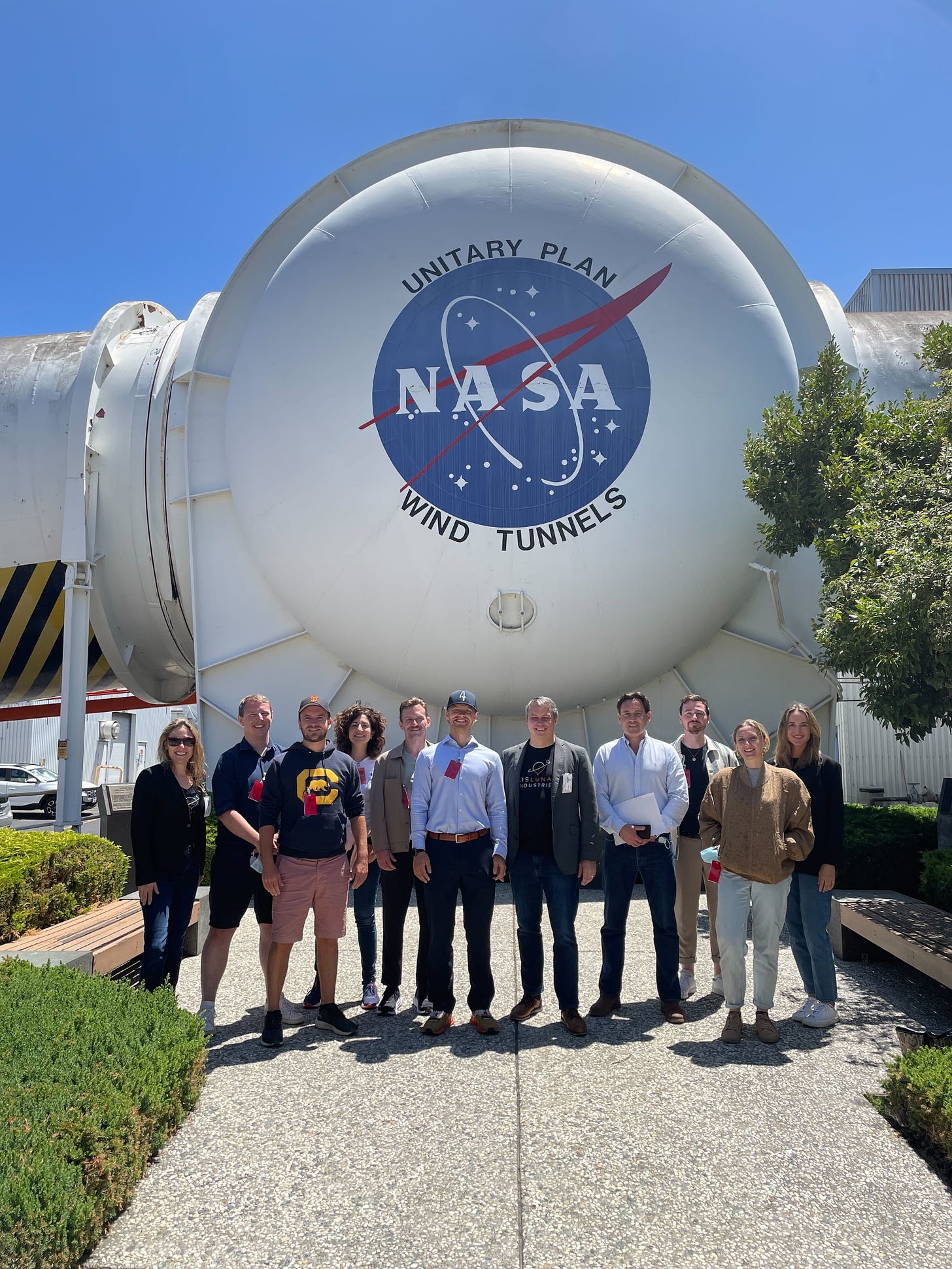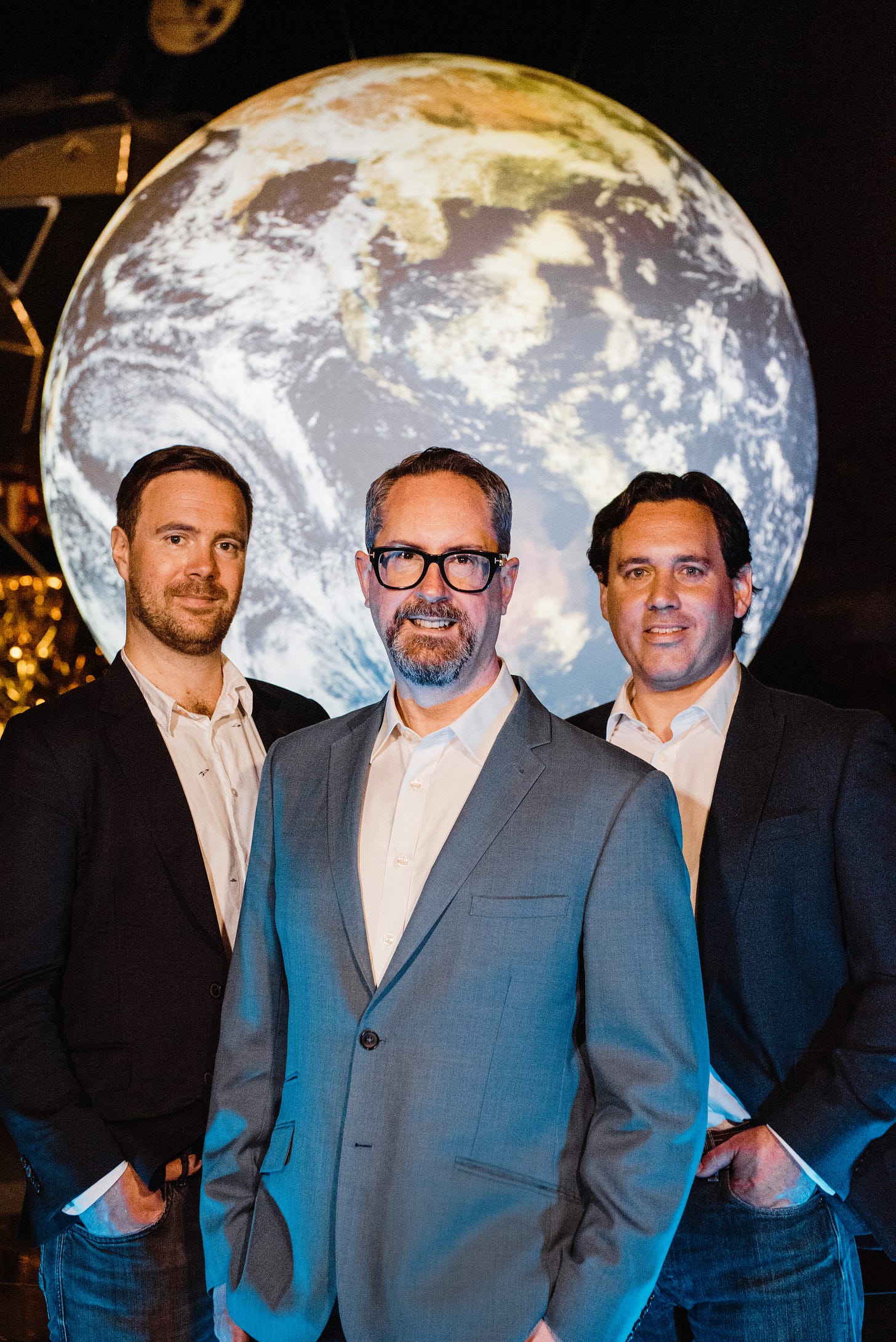Spotlight: Rob Desborough - Managing Partner @ Seraphim Space & CEO Seraphim Space Accelerator
Dive into insights from an investor backing 70 spacetech startups, tracking 800 others. Learn about his space talks with King Charles and the new wave of PhD entrepreneurs from academia.
Issue No 49. Subscribers 7507.
We had the pleasure of having lunch in London with Rob Desborough, Managing Partner at Seraphim Space and Generation Space. Seraphim Space is the leading space-focused investor globally who manages a VC fund, a spacetech accelerator and the world's first listed fund focused on spacetech Seraphim Space Investment Trust PLC.
With over two decades in technology venture capital, Rob boasts an impressive history, having supported over 70 spacetech companies worldwide. Notably, three of these have gone on to IPO on Nasdaq and NYSE. During our conversation, we delved deep into Rob's insights on the current state of the industry and its emerging trends.
Could you provide more insights into Seraphim and its endeavors?
Seraphim is a premier VC fund specializing in spacetech, with accelerator programs rooted in London, San Francisco, and Singapore. We're actively monitoring a dynamic portfolio of over 800 space tech startups from around the globe. Our accelerator alumni have collectively secured $385M in funding from a network of 100 esteemed investors. In addition to our venture activities, we proudly manage the Seraphim Space Investment Trust Plc, a noteworthy entity listed on the London Stock Exchange.
Having transitioned from a general VC role to a space tech VC position, how do you perceive the differences between the two?
While the foundational principles of investment remain consistent, spacetech introduces unique intricacies. This can span from advanced scientific concepts to in-depth engineering and an understanding of the industry sales cycles. We're fortunate at Seraphim to have an exceptional team of analysts, bolstered by knowledgeable LPs and Board members who aid in our due diligence processes.
A striking difference in the spacetech domain lies in its founders. Their deep passion for the technical intricacies is evident. In a 5-minute pitch, they might devote almost the entirety of their time to explaining technical details, leaving mere seconds for the business aspect. Recognizing this trend, and understanding that generalist investors might find this overwhelming, we established our accelerator program to address this gap. Start-ups interested can apply here: https://www.f6s.com/seraphim-space-accelerator/about.
Lately, we've observed an emerging 'breed' of Ph. D.s from academia. Not only are they driven to make a transformative impact on the world, but they also aspire to claim a stake in it. We're enthusiastic about collaborating with such founders.
Another distinction lies in the space tech investment community's collegiality. Spacetech investors demonstrate a commendable spirit of collaboration. It's not uncommon for us to share our pipeline or even due diligence insights with peers from other funds. This contrasts starkly with my experiences in London's VC scene in 2008, where investments were often closely guarded secrets.
How have the investment dynamics in the space tech sector evolved over the recent years?
Historically, while there was an abundance of early-stage investors in space (spanning pre-seed, seed, and Series A rounds), there was a shortage of follow-up investors for Series B and beyond. This scarcity stemmed from the influx of 'generalist' investors, like sovereign funds and asset managers, during these stages. Often, they found it challenging to evaluate spacetech companies given their unique parameters.
However, this landscape is evolving. Recent studies by PWC and the UK Space Agency indicate that spacetech investments are becoming more mainstream and increasingly accessible. In the height of space investments in 2021, a remarkable 63% of all space sector investors were newcomers. Furthermore, 13 of the top 15 global venture capital firms and 8 of the largest 15 private equity firms have ventured into the space sector. Between 2020 and 2022, the number of distinct space sector investors more than doubled, growing from 274 to 558. Interestingly, in 2022, 64% of corporate investments in the space sector originated from sectors outside of aerospace and defense. This includes fields like technology, telecommunications, media, finance, and automotive, to name a few.
These statistics are not just promising—they're indicative of an industry maturing and readying itself for the next phase of growth.
In 2023 investment activity remained strong, particularly at the early stages, with the number of seed deals growing almost 55% increase year on year. At the beginning of the year, it was fantastic to see Europe had for the first time overtaken the US in private spacetech investment. Private investors were catching up with the enormous importance that European governments had placed on space sovereignty in launch, constellations, and communications. Q2 has seen the US again hit the ‘top spot’ in deal volume and magnitude, but momentum in Europe has not diminished. European deals have grown by over 60% over the last 12 months and in Asia by 79%. Space is becoming truly global and it’s great to see. To keep up to date with trends readers can download our quarterly released ‘Seraphim Space Index’ for a deeper dive into the investment landscape.
Could you recommend some top spacetech conferences for our readers to consider attending?
We routinely participate in prominent industry events including the Satellite Show, Small Satellites, and Space Symposium. The GSTC in Singapore, in particular, offers an efficient platform to connect with many stakeholders in a condensed time frame. Lately, our presence has expanded to non-space-centric conferences like Web Congress, Next, and Slush, reflecting the growing integration of space technology within diverse sectors. On another noteworthy occasion, King Charles extended an invitation for us to join the Space Sustainability Reception at Buckingham Palace – a significant acknowledgment of the industry's importance.

The much-anticipated question: What are your projections for future investment trends? *Please note, this isn't investment advice.
Currently, the primary revenue drivers in our portfolio revolve around global security and climate change. We're keenly exploring sectors like sustainability, LEO constellations, and in-orbit services. There's a burgeoning potential in the in-space production of advanced materials and life sciences research, particularly in areas like antibody research. While the International Space Station (ISS) once posed a bottleneck for such research, emerging platforms like Space Forge, Varda, and Space Pharma are providing new avenues.
The UK space tech market is showing vibrant growth with key players like Astroscale and D-orbit making significant strides. In the longer term, we anticipate space mining to gain momentum, currently driven primarily by initiatives from China. We might even pivot to this as a central theme in one of our upcoming funds. Moreover, space solar appears poised to be the next game-changer. We also forecast a major overhaul in the insurance industry through the application of space tech, which can pave the way for cost-effective expansion, tapping into new demographics, and reaching uncharted territories. Space we believe can help solve some of humanity’s most pressing problems, the mantra might be more about "looking down" rather than solely "looking up." While space tourism holds promise, it constitutes just a fraction of the available potential. We're endeavoring to shift this narrative.
Thank you Rob for your insights!
At Space Ambition, we aim to ignite a passion for space exploration. Whether you're a VC, business entity, angel investor, accelerator, or contemplating a launch, reach out to our research hub at hello@spaceambition.org. Let's explore how we can collaborate. The space sector eagerly awaits your contribution.










